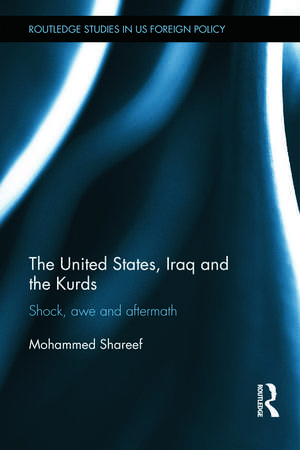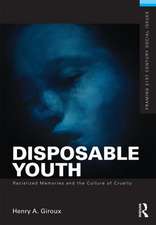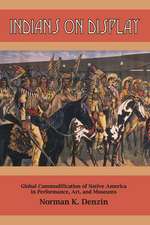The United States, Iraq and the Kurds: Shock, Awe and Aftermath: Routledge Studies in US Foreign Policy
Autor Mohammed Shareefen Limba Engleză Hardback – 20 feb 2014
The book is unique in that it presents a sophisticated insight into the two major components of US Iraq policy. To achieve this, it addresses US foreign policy towards both Arab Iraq and an entirely original analysis on US policy towards the Iraqi Kurds as components of a larger US Iraq policy, dictated by the supreme US Grand Strategy. The book also examines whether US foreign policy towards Iraq has been one of continuity or change – a dimension that has not been illustrated in any other publication. The book deals intelligently and at great length with the events surrounding US Iraq policy in three distinct phases, going back to, 1979 with regard to Arab Iraq, and 1961 in respect to the Kurdish liberation movement, covering all subsequent US administrations including the Obama presidency. It provides a thorough examination of US interests in Iraq and reasons for the 2003 invasion and its aftermath. It also engages with the intellectual roots of US foreign policy, presenting an intricate reaction of views, objectives and agendas.
This work will be of interest to students and scholars of Middle East studies, US Foreign Policy and Security studies.
Din seria Routledge Studies in US Foreign Policy
-
 Preț: 286.05 lei
Preț: 286.05 lei -
 Preț: 304.19 lei
Preț: 304.19 lei -
 Preț: 309.93 lei
Preț: 309.93 lei - 9%
 Preț: 935.09 lei
Preț: 935.09 lei -
 Preț: 326.14 lei
Preț: 326.14 lei -
 Preț: 326.14 lei
Preț: 326.14 lei -
 Preț: 358.41 lei
Preț: 358.41 lei - 18%
 Preț: 1115.99 lei
Preț: 1115.99 lei -
 Preț: 363.58 lei
Preț: 363.58 lei - 14%
 Preț: 330.10 lei
Preț: 330.10 lei - 18%
 Preț: 698.08 lei
Preț: 698.08 lei - 18%
 Preț: 1055.51 lei
Preț: 1055.51 lei -
 Preț: 412.62 lei
Preț: 412.62 lei - 16%
 Preț: 338.68 lei
Preț: 338.68 lei -
 Preț: 467.44 lei
Preț: 467.44 lei - 18%
 Preț: 1057.40 lei
Preț: 1057.40 lei - 26%
 Preț: 764.20 lei
Preț: 764.20 lei - 18%
 Preț: 1053.47 lei
Preț: 1053.47 lei - 18%
 Preț: 1051.60 lei
Preț: 1051.60 lei -
 Preț: 465.15 lei
Preț: 465.15 lei - 28%
 Preț: 822.36 lei
Preț: 822.36 lei - 19%
 Preț: 238.40 lei
Preț: 238.40 lei -
 Preț: 351.66 lei
Preț: 351.66 lei -
 Preț: 463.77 lei
Preț: 463.77 lei -
 Preț: 463.62 lei
Preț: 463.62 lei - 18%
 Preț: 1112.34 lei
Preț: 1112.34 lei - 28%
 Preț: 820.03 lei
Preț: 820.03 lei - 18%
 Preț: 1108.37 lei
Preț: 1108.37 lei - 18%
 Preț: 1060.52 lei
Preț: 1060.52 lei - 18%
 Preț: 1057.57 lei
Preț: 1057.57 lei -
 Preț: 410.50 lei
Preț: 410.50 lei - 28%
 Preț: 819.09 lei
Preț: 819.09 lei -
 Preț: 484.08 lei
Preț: 484.08 lei - 18%
 Preț: 1054.71 lei
Preț: 1054.71 lei - 18%
 Preț: 1053.92 lei
Preț: 1053.92 lei - 18%
 Preț: 1057.40 lei
Preț: 1057.40 lei -
 Preț: 464.16 lei
Preț: 464.16 lei -
 Preț: 319.59 lei
Preț: 319.59 lei - 18%
 Preț: 701.56 lei
Preț: 701.56 lei
Preț: 820.73 lei
Preț vechi: 1140.95 lei
-28% Nou
Puncte Express: 1231
Preț estimativ în valută:
157.06€ • 170.55$ • 131.93£
157.06€ • 170.55$ • 131.93£
Carte tipărită la comandă
Livrare economică 22 aprilie-06 mai
Preluare comenzi: 021 569.72.76
Specificații
ISBN-13: 9780415719902
ISBN-10: 0415719909
Pagini: 250
Dimensiuni: 156 x 234 x 20 mm
Greutate: 0.5 kg
Ediția:New.
Editura: Taylor & Francis
Colecția Routledge
Seria Routledge Studies in US Foreign Policy
Locul publicării:Oxford, United Kingdom
ISBN-10: 0415719909
Pagini: 250
Dimensiuni: 156 x 234 x 20 mm
Greutate: 0.5 kg
Ediția:New.
Editura: Taylor & Francis
Colecția Routledge
Seria Routledge Studies in US Foreign Policy
Locul publicării:Oxford, United Kingdom
Cuprins
Chapter 1: INTRODUCTION, Chapter 2: US IRAQ POLICY Pre September 11: Reconising a Failing STRATEGY, Chapter 3: Intellectual Roots of the Bush Foreign Policy: The Power of Ideas, Chapter 4: Invading Iraq: One Decision, VARIOUS Reasons, Chapter 5: The War In Iraq: A Planned War, An Unplanned Occupation, Chapter 6: THE IRAQI KURDS IN US FOREIGN POLICY: from Kennedy to OBAMAChapter 7: CONCLUSION
Recenzii
"There have been few winners following the war to depose Saddam Hussein in Iraq in 2003: the Iraqi Kurds may however be one of them as Mohammed Shareef explains in this lucid volume. We shall now have to wait and see whether a fully independent Kurdistan can become what many thought it never could in the past – a source of stability in a region that continues to be plagued by tensions and conflicts. A must read book on a crucial geostrategic issue."
Michael Cox, Professor of International Relations, London School of Economics, UK
"The value of Dr Shareef’s excellent new book on Iraq is not just in its discussion of the roots of the crisis, the extraordinary level of detail therein and the enlightening interviews, not only for its rich insights and extensive data collection, not simply for the valuable and textured commentary that it provides on American policy making, but equally importantly for the crisp analysis that it provides of the aftermath of the 2003 war on the body politics of Iraq, particularly on its substantial and often oppressed Kurdish communities. This is one for the reference collection!"
Anoushiravan Ehteshami, Professor of International Relations, University of Durham, UK
"Shareef’s study is a welcome and timely in-depth study of US foreign policy developments in Arab Iraq and Kurdistan Iraq especially after the US invasion of Kuwait in 1991 and invasion and occupation of Iraq in 2003. He embeds his study in three Grand Strategies: one, 1979-1990 influenced by the Cold War; two, 1991-2001, stresses the liberal international strategy and three, the War on Terror from 2002-2013. Diplomatic scholars will be particularly interested in phase three which analyses the role of the Kurds of Iraq in the formation of US policies toward the wider Middle East; a hitherto topic largely ignored by scholars. During phase three Shareef argues that for geopolitical and geostrategic interests the US pursued (and still does) policies of maintaining a unified Iraq even as developments in Kurdistan Iraq were/are moving toward self-determination. The eventuation of an independent Kurdistan would of course seriously affect US foreign policies toward Turkey, Iran and Syria all of whom oppose an independent Kurdish state in Iraq. This will result in the Kurdish question becoming even a more salient factor in the making of US foreign policies not just toward the Middle East but internationally. Shareef’s study is one of only a few that uses Arab and Kurdish based source. I recommend it highly to scholars and policy makers."
Robert Olson, Professor of Middle East History and Politics, University of Kentucky, USA
"This book effectively addresses the different actors at different levels that have played a role in shaping today’s Iraq. Overall, it represents a useful tool for those, students and scholars alike, interested in US foreign policy towards the Middle East, especially Iraq and the Iraqi Kurds."
Sofia Zavagli, The Internation Spectator
The central purpose of the book is "to address change and continuity in US Iraq policy" (p. 2) and it aims to fill the gap in studies addressing US Iraq policy. Yet, US Iraqi foreign policy is part of the broader US Middle Eastern foreign policy and Iraq, as the US administration’s focus from 1991 onwards, has been extensively researched.
Marianna Charountaki, Reading University, UK
Michael Cox, Professor of International Relations, London School of Economics, UK
"The value of Dr Shareef’s excellent new book on Iraq is not just in its discussion of the roots of the crisis, the extraordinary level of detail therein and the enlightening interviews, not only for its rich insights and extensive data collection, not simply for the valuable and textured commentary that it provides on American policy making, but equally importantly for the crisp analysis that it provides of the aftermath of the 2003 war on the body politics of Iraq, particularly on its substantial and often oppressed Kurdish communities. This is one for the reference collection!"
Anoushiravan Ehteshami, Professor of International Relations, University of Durham, UK
"Shareef’s study is a welcome and timely in-depth study of US foreign policy developments in Arab Iraq and Kurdistan Iraq especially after the US invasion of Kuwait in 1991 and invasion and occupation of Iraq in 2003. He embeds his study in three Grand Strategies: one, 1979-1990 influenced by the Cold War; two, 1991-2001, stresses the liberal international strategy and three, the War on Terror from 2002-2013. Diplomatic scholars will be particularly interested in phase three which analyses the role of the Kurds of Iraq in the formation of US policies toward the wider Middle East; a hitherto topic largely ignored by scholars. During phase three Shareef argues that for geopolitical and geostrategic interests the US pursued (and still does) policies of maintaining a unified Iraq even as developments in Kurdistan Iraq were/are moving toward self-determination. The eventuation of an independent Kurdistan would of course seriously affect US foreign policies toward Turkey, Iran and Syria all of whom oppose an independent Kurdish state in Iraq. This will result in the Kurdish question becoming even a more salient factor in the making of US foreign policies not just toward the Middle East but internationally. Shareef’s study is one of only a few that uses Arab and Kurdish based source. I recommend it highly to scholars and policy makers."
Robert Olson, Professor of Middle East History and Politics, University of Kentucky, USA
"This book effectively addresses the different actors at different levels that have played a role in shaping today’s Iraq. Overall, it represents a useful tool for those, students and scholars alike, interested in US foreign policy towards the Middle East, especially Iraq and the Iraqi Kurds."
Sofia Zavagli, The Internation Spectator
The central purpose of the book is "to address change and continuity in US Iraq policy" (p. 2) and it aims to fill the gap in studies addressing US Iraq policy. Yet, US Iraqi foreign policy is part of the broader US Middle Eastern foreign policy and Iraq, as the US administration’s focus from 1991 onwards, has been extensively researched.
Marianna Charountaki, Reading University, UK
Descriere
A descriptive and analytic narrative addressing continuity and change in US policy towards both Arab Iraq and Iraqi Kurdistan.
















